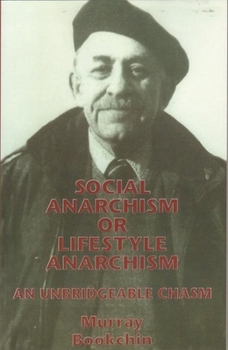Social Anarchism or Lifestyle Anarchism: An Unbridgeable Chasm
Related Subjects
Anarchism Political Science Politics & Government Politics & Social Sciences RadicalismCustomer Reviews
Rated 5 starsThe chasm has widened beyond view...
Murray Bookchin's honest eye-opening piece, "Social Anarchism or Lifestyle Anarchism: An Unbridgeable Chasm," rightfully and finally asks the question that had been festering in the anarchist movement since the days of Proudhon; either anarchism will be social or it will be lifestyle. Ultimatley Bookchin would break with anarchism, "I'm tired of defending anarchism against the anarchists": "I do not fault myself for trying...
1Report
Rated 5 starsAll those who identify as Anarchists need to read and grapple with this book
Written some ten years ago, Bookchin's devasating and concise critique is even more relevant today then when it was written. Anarchism today in the English speaking world especially is in a state of total disarray, having its socialistic core washed away and its previous concern for genuine change and an actual social revolution destroyed. In 1999 Bookchin, as a result of what was happening to Anarchism in the West, broke...
0Report
Rated 4 starsa grumpy man that should be heard
I'll concede that Bookchin comes across like a grumpy old man. On the other hand, he has a deep insight that close attention should be paid to. He makes a distinction between freedom and autonomy, and points out that freedom is a social condition which precedes autonomy. Autonomy has become sacrosanct in our American culture. Bookchin gives scathing critiques of a few anarchist books with ideas that overemphasize autonomy...
1Report
Rated 4 starsLong on Polemics, Short (but sweet) on Positive Vision
This book contains "a short note to the reader" and two essays. At 86 pages, it looks to be a short, fast read. It isn't. (I started reading in Anchorage, continued reading during an hour layover in Seattle, and finished about 20 minutes before arriving in LA!) Bookchin stakes out his reasons for writing the first essay in a "note to the reader" that begins with:"Anarchists have formed neither a coherent program nor a revolutionary...
1Report
Rated 4 starsGreat, much needed criticism
Bookchin does an excellent job in critiquing the "lifestyle anarchism" that permeates much of the left. Instead of working for social justice activism, lifestylists would rather retreat into mysticism and petty-bourgeois subcultures. Analyzes many of the key theorists of this genre. Good resource for serious left activists.
0Report














